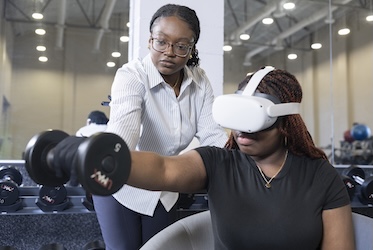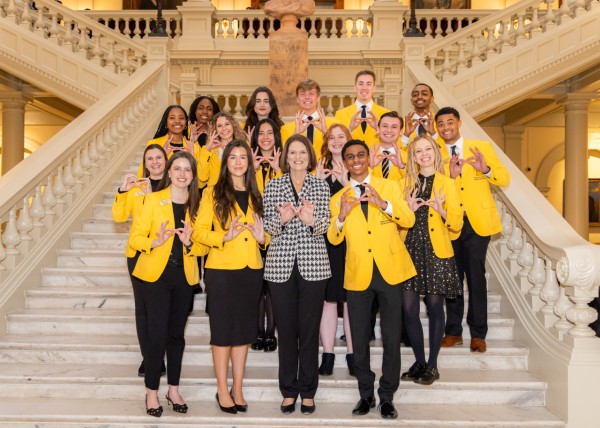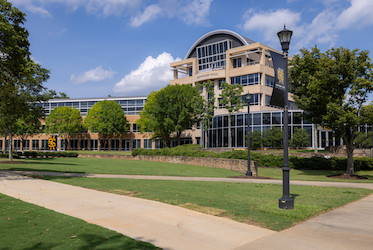
Kennesaw State professor studies leadership styles among CEOs
KENNESAW, Ga. | Sep 20, 2024

In a recent article published in the European Journal of Marketing, Kennesaw State University assistant professor Prachi Gala found that women CEOs often choose human-centered approaches when giving back to society.
“In many cases, women tend to consider the interdependence of the community when making decisions.,” said Gala, who teaches marketing and professional sales in the Coles College of Business. “Interdependence is the keyword here. Men often prioritize more product-focused strategies, which may involve a different approach to community consideration.”
Co-authored with colleagues from the University of Mississippi and Union University, the research explores corporate social responsibility (CSR), or the idea that companies are responsible to society, not just their customers and investors.
CSR can take many forms. For example, in 2021, Coca-Cola sought to address environmental concerns with the release of a bottle prototype made from 100% plant-based sources. Another example of companies tackling societal issues is when BMW partnered with UNICEF to address educational disparities across the world through BRIDGE, a program that provides STEM training to parts of Africa, Asia and South America.
However, a more modest example of CSR would be a company’s efforts to seek initiatives that promote work-life balance, such as offering employees flexible work schedules, gym memberships and robust parental leave and family-forming and reproductive benefits.
“As a CEO, I might ask: Are we celebrating our employees?” Gala said, describing the questions a CEO might ponder in their search for opportunities to give back. “Are we promoting work-life balance, for example, through a four-day work week? Diversity is also crucial: Is my company diverse enough, and are we actively embracing and celebrating that diversity?”
That’s not to imply that corporate social responsibility is a woman’s game. Far from it. One need not look far to find examples of male CEOs developing local and global CSR initiatives. Where Gala’s research distinguishes itself is in the way it breaks down CSR initiatives into two subtypes: relational and rational.
“Relational CSR focuses on initiatives that directly benefit people,” said Gala, “while rational CSR involves decisions where the primary goal may not be human-centric, although the outcomes can still impact people.”
Coca-Cola's prototype would be an example of rational CSR because it seeks to address societal concerns by developing a 100% plant-based bottle, or a product. By contrast, BMW and UNICEF’s BRIDGE program would be considered relational CSR because it seeks to address societal concerns by developing people through educational opportunities. Here, human development is the goal.
“Dr. Gala has been very diligent in her research into corporate social responsibility,” Coles College Dean Robin Cheramie said. “This is a timely issue with many organizations examining their roles within the wider community. Prachi's exploration into how different CEOs approach this idea is helping move corporate research forward and is a perfect example of the kind of scholarship taking place at the Coles College of Business, and across Kennesaw State University.”
For many, Gala’s research can seem like a million miles away from their everyday lives. However, understanding corporate social responsibility and its two subtypes can be beneficial to anyone looking to work for a new company.
“As you advance in your career, you evolve and recognize the importance of aligning with a company's principles,” Gala said. “You gain wisdom in understanding that you want the company you work for to reflect certain values. It’s important for many people, including myself, that a company aligns with their personal principles, and the extent to which a firm engages in corporate social responsibility plays a key role in that alignment.”
– Story by Spencer Kealamakia
Photo submitted
Related Stories

Kennesaw State professor honored by American Accounting Association as 2025 Presidential Scholar

Kennesaw State business student finds research niche in virtual reality

Day at the Capitol: Kennesaw State community members visit with legislators under the Gold Dome

Kennesaw State's online degree programs nationally ranked by U.S. News
A leader in innovative teaching and learning, Kennesaw State University offers undergraduate, graduate, and doctoral degrees to its more than 47,000 students. Kennesaw State is a member of the University System of Georgia with 11 academic colleges. The university’s vibrant campus culture, diverse population, strong global ties, and entrepreneurial spirit draw students from throughout the country and the world. Kennesaw State is a Carnegie-designated doctoral research institution (R2), placing it among an elite group of only 8 percent of U.S. colleges and universities with an R1 or R2 status. For more information, visit kennesaw.edu.














